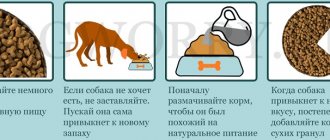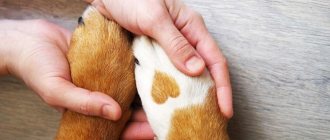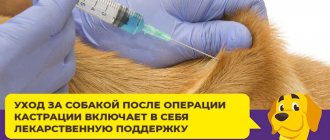Vomiting is the body’s protective reaction to poisoning or another negative condition that can cause severe stomach cramps. Nausea and vomiting are not independent pathologies. They indicate negative changes occurring inside that affect the digestion process. One of the types of vomiting in dogs is undigested food. Typically, this symptom indicates a disease of the gastrointestinal tract. The condition can be dangerous and require urgent treatment. In other cases there is no cause for concern. It is important to be able to recognize the signs of disease, and if you suspect or have any doubts about a serious illness, you should contact your veterinarian.
Nausea and vomiting in dogs is common.
Types of vomiting and probable causes
If your dog vomits after eating undigested food, there may be a variety of reasons for this. They can be divided into two categories:
- Physiological. They are not life-threatening for the pet.
- Pathological. Vomiting is caused by various disorders in the functioning of internal organs.
If the symptom does not recur and the pet behaves as usual, then the reason why the dog’s food comes out and is not digested may be:
- Binge eating. Animals need to be supervised, as many dogs do not feel full and eat until they start vomiting. You should not feed your pet from the table - “human” food is especially difficult for a dog’s stomach.
- Motion sickness. The vestibular system in dogs does not always withstand long trips (just like in humans).
- Eating grass. Substances contained in the herb help remove toxins from the body.
Important! Outdoor grass can be contaminated with parasite eggs, so it is better to give your dog purchased greens or home-grown ones.
- A sharp change in the usual diet. This applies to both replacing one dry food with another (a certain amount of granules of the new product should be mixed into the old one), and switching from one type of food to another (for example, from natural to dry).
- Strong emotional shocks.
Changing your usual lifestyle is stressful for your pet. Such events include:
- estrus;
- pregnancy (nausea and vomiting are typical manifestations of toxicosis during pregnancy);
- childbirth;
- moving;
- drive;
- visiting a veterinarian;
- fight with other animals;
- the arrival of guests or the arrival of a new family member;
- quarrel between owners;
- participation in exhibitions.
In addition, this phenomenon can be caused by:
- Air temperature. In hot weather, the dog may become ill, with nausea and vomiting (especially if the pet has drunk too much liquid).
- Air ingestion from food during hasty swallowing. This is why a dog sometimes burps in the absence of nausea.
- Exercise immediately after feeding.
- Stale food. Dogs are not averse to eating food found on the street or in a trash can. Animals are completely devoid of disgust and “sweep” almost everything. If such whims ended with only vomiting, then we can say that the dog was lucky. The problem can also be caused by low-quality feed (usually the cheapest).
- Individual characteristics. In very rare cases, the reason why a dog vomits undigested food after eating cannot be determined.
If we talk about pathological reasons, they include:
- Exacerbation of infectious diseases.
- Entry of a foreign body into the stomach.
- Allergic reaction.
- Intestinal obstruction (in this case, feces may be released along with vomiting).
- Internal bleeding.
- Chronic diseases of the digestive system (enteritis, ulcers, gastritis).
- Helminthiasis.
- Infections transmitted by fleas, ticks and other ectoparasites.
- Poisoning by poisons.
- Malignant neoplasms.
- Pathologies of the urinary system (one of the most severe is renal failure).
- Disruption of the central nervous system due to traumatic brain injury, the formation of malignant tumors, increased intracranial pressure or infection with meningitis.
Infections often cause vomiting.
Note! Typically, gagging occurs immediately after eating or some time after feeding (for example, when a puppy vomits food one hour after feeding).
If the symptom occurs 1.5-2 hours after the dog has eaten, or in the morning after an evening feeding, then the cause may be a decrease in gastric motility (due to poor nutrition or infection with pathogenic bacteria).
The specific cause can be determined by the color of the foamy discharge present in the vomit. Foam can have the following shades:
- Green. Indicates infection with worms. Parts of parasites and their eggs can also come out.
- White. If the dog has vomited once, such foam is not a dangerous symptom. Its appearance may be associated with heat or heavy physical exertion. If vomiting occurs repeatedly, the cause may be a foreign object entering the gastrointestinal tract. This leads to increased production of mucus, which is removed from the body and, due to interaction with oxygen, turns into foam.
- Yellow. This color is given by bile, which has accumulated in large quantities. This is caused by digestive disorders, pathologies of the gallbladder and liver.
- Red. Indicates internal damage (in the esophagus, stomach, intestines). Bleeding can be caused by a foreign body getting stuck in the digestive tract, ulcers, or tumors.
Important! In the presence of pathological causes, vomiting is accompanied by a deterioration in the general condition of the dog, decreased activity and lack of appetite.
Dog vomiting and refusing to eat
Physiological reasons often cause nausea in a pet. Stomach cramps occur as a result of:
- changes in hormonal levels in pregnant and lactating bitches;
- change of feed;
- allergic reaction;
- overeating or getting air with food when swallowing hastily;
- eating grass, raw vegetables, cruciferous plants;
- overheating caused by prolonged exposure to the sun;
- intense exercise immediately after feeding.
For relatively normal reasons, the pet’s well-being deteriorates slightly. The animal remains interested in games. There are no changes in body temperature. Immediately after cleansing the stomach, good appetite is restored.
In the absence of the above reasons, nausea should be considered an alarming symptom. Stomach cramps can be triggered by poisoning, intestinal obstruction, parasitic infestation, chronic, acute gastric diseases, foreign object penetration, stomach trauma, as well as pathological formations.
Vomiting occurs as a response to intoxication caused by renal failure, bacterial and viral infections, and secondary poisoning by cell death products.
Nausea may also indicate disturbances in the functioning of the central nervous system resulting from traumatic brain injury, tumor development, changes in intracranial pressure, or infection with meningitis.
Vomiting in pathological cases is accompanied by a decrease in the pet’s activity and complete refusal of food.
To objectively assess your pet’s condition and prescribe treatment, you should definitely contact a veterinarian. But to make a correct diagnosis, the doctor will need detailed information about:
- dependence of nausea on meals;
- frequency of gastric content rejection;
- consistency of vomit.
Differences in the causes of vomiting and regurgitation
The mechanism of vomiting is that food gets onto the irritated mucous surface of the stomach, and this provokes a reflex contraction of tissue in the diaphragm, after which uncontrolled ejection of undigested masses and other contents occurs through the esophagus.
On a note! The muscles of the peritoneum and pharynx are involved in the process of removing vomit, and the preceding symptom is always nausea.
Also added to it:
- restless behavior;
- excessive salivation;
- whining.
It is not difficult to distinguish vomiting from regurgitation. The first can be recognized by abdominal contractions and the consistency of the rejected masses. Regurgitation is the movement of food or liquid in a hollow organ. The stomach muscles are involved in this process. Most often, the reason why a dog can burp is a malfunction of the sphincter, and the reaction itself occurs immediately after eating or drinking. The contents usually follow the shape of the esophagus.
Regurgitation in a dog
Attention! When a dog regurgitates food, the diaphragm and abdominal cavity do not contract.
Main causes of food vomiting
In most cases, a dog can burp immediately after eating and after a short period of time. There are several reasons why this process occurs:
- ingestion of poisons into the body;
- consumption of low-quality food;
- entry of a foreign body into the esophagus or stomach;
- development of infectious diseases;
- helminth infection;
- individual intolerance to some components;
- intestinal obstruction.
If a dog vomits after eating undigested food, this may indicate a disturbed fermentation process, the development of stomach ulcers, gastritis, damage to the stomach wall and the penetration of a foreign body. Food entering the stomach comes into contact with irritated mucous membranes. As a result, the muscle tissue of the diaphragm contracts and food is involuntarily removed.
Overeating, as one of the causes of vomiting, is common
Important! Vomiting 1.5-2 hours after eating is a dangerous symptom warning of a deterioration in gastric motility.
When vomiting is not dangerous
The degree of danger of this reaction depends on the cause that caused it. Vomiting caused by:
- stress;
- overeating;
- pregnancy;
- eating grass;
- drinking plenty of water in hot weather;
- abrupt transition to a different diet;
- consumption of expired products.
The reasons listed are physiological in nature and therefore safe. It is important that the dog has no other symptoms and that the pet feels well.
By eating fresh grass, the dog tries to cleanse the body of toxins.
Types of vomiting in a puppy
Whether you need to worry and consult a doctor without delay will tell you not only the cause, but also the type of vomiting. You can only monitor your puppy and take a medical history if the vomit is clear or contains some foam.
Any inclusions in the vomit indicate serious problems.
Vomiting with orange or yellow inclusions, including foam, indicates an abundant release of bile into the intestines. The phenomenon is expected if the puppy has been starving for a long time. After hunger, the pet needs to be fed fractionally - in very small portions and often. To reduce the load on the intestinal walls, it is better to temporarily switch the puppy to liquid feeding - broths, eggs, fermented milk products.
Vomiting blood
Blood in the vomit is a very alarming symptom, indicating:
- Physical damage to the walls of the gastrointestinal tract - if scarlet blood damages the upper gastrointestinal tract, respiratory tract or oral cavity. Clots of dark, coagulated blood indicate damage to the walls of the stomach or intestines.
- Poisoning with severe toxins or poisons.
Regardless of the reasons, if bloody vomit appears, the dog must be taken to the doctor immediately. If a pet is poisoned, it is given first aid on the way to the clinic or while waiting for a veterinarian to be called to the house. It is extremely important to relieve intoxication by using adsorbents and antidotes, if necessary.
Note! If vomiting with blood is caused by a chronic disease, complex therapy is prescribed. The primary task in this case is to eliminate dehydration.
Vomiting with worms
Vomiting with worms indicates:
- Extreme degree of infestation by intestinal parasites.
- Infection with pulmonary parasites.
- Infection with parasites, the larvae of which are able to migrate with the bloodstream.
Note! Lung parasites can cause severe pneumonia, which can be fatal for small puppies. Infection with parasites, the larvae of which migrate through the bloodstream, indicates feeding with low-quality foods or lack of care.
The good news is that regardless of the type of infestation, the problem can be solved with broad-spectrum antiparasitic drugs. Naturally, there is also bad news. The extreme degree of infestation by intestinal parasites leads to nutritional deficiency, vitamin deficiency and constantly increasing intoxication. A weakened body becomes vulnerable to viral diseases, so it is important to take all precautions when visiting a veterinary office.
How to help your pet
If a dog burps once after eating, then it will not need help. This reaction helps the body get rid of harmful substances and restore normal health.
Repeated vomiting requires intervention, as it significantly worsens the dog’s general condition, leading to dehydration and loss of nutrients. This reaction is most dangerous for puppies, since a fragile body may not withstand severe dehydration.
Before visiting the veterinarian, you should provide first aid to your pet and collect information for the doctor:
- Record the frequency of calls.
- Determine the color and consistency of the masses, check for impurities.
- Identify other symptoms that accompany the urge.
- Analyze previous events that could provoke the problem (purchase of low-quality food, change of diet, eating leftover food found on the street, etc.).
- Give your dog plenty of water, provided it does not cause further vomiting. If your pet refuses to drink, it is recommended to give him warm, sweetened water from a syringe without a needle.
- You can't feed the dog.
- Antiemetic drugs should not be taken because vomiting helps eliminate toxins.
- If the animal has lost consciousness, it must be turned over on its side and its mouth opened so that the pet does not choke on the contents of the stomach.
- In case of poisoning, the dog should be immediately given activated charcoal or a laxative.
You cannot feed a dog if it is vomiting.
The veterinarian must determine the cause of this reaction, for which he conducts the following studies:
- blood analysis;
- Ultrasound of the abdominal cavity;
- performs a gastroscopy to determine the location of a foreign object or tumor.
Ultrasound of the abdominal cavity
If the animal is severely dehydrated, the dog is given a drip with saline solution.
Attention! Treatment is prescribed depending on the identified disease.
Veterinarians usually prescribe the following medications:
- laxative;
- medications that reduce stomach acidity;
- antispasmodics;
- drugs that slow down the gag reflex.
You will also need a special diet:
- Refusal to eat during the day.
- Feeding liquid and low-fat foods. On the second day, chicken broth is given. When the signs of vomiting completely disappear, the pet can be switched to rice and oatmeal porridge, boiled vegetables and fresh herbs, and chicken fillet.
- Meals should be fractional, that is, in small portions 5-6 times a day.
- It is important that the food is warm and fresh. Uneaten leftovers should be thrown away.
Attention! You can switch to a regular diet only on the third day, provided that the pet feels normal.
Why might a dog vomit immediately after eating?
Vomiting of undigested food does not always indicate the presence of any pathology in the pet. This phenomenon can be caused by various harmless factors. Among them:
- An animal swallowing too much food at once. This often happens with very hungry animals, whose owners do not feed them according to schedule and do not in any way limit the amount of food they eat.
- Getting the grass into the stomach of the animal.
- Consumption of low-quality food containing synthetic filler, ash, and flavor enhancers.
- The need to feed the offspring. Bitches who have recently given birth can do this. They regurgitate only part of the food they eat. The appearance of such a symptom in such animals is not a pathology. If a bitch is not losing weight, her owner may not pay much attention to it.
- Pregnancy.
- Taking strong medications.
- Motion sickness when riding in a car or other transport.
- A sudden change in diet. This factor may occur if, after vomiting, the pet’s appetite is good and he himself shows interest in new food. In this case, the dog breeder is recommended to give him new food in doses. If he does not stop burping after a meal, you need to return to the old menu. It is possible that the pet has a food allergy that the person was not previously aware of. It can provoke vomiting.
- Severe stress. These include attacks by other animals, moving, and conflicts with the owner.
- Heatstroke.
- Severe hunger. In such cases, the dog simply tries to get rid of excess gastric juice by vomiting. A simple diet correction can solve this problem.
- Excessive physical activity. With this factor, alarming symptoms will occur several hours after eating.
The above reasons lead to vomiting, which, as a rule, does not recur in the future. If the pet’s symptom goes away quickly, he feels well, the dog owner should not worry about this. Just watch your pet for a few hours to make sure everything is okay with him. If the vomiting is repeated, the animal’s condition worsens, which means that other, more serious factors were at play. These could be:
- Infectious diseases that affect internal organs.
- Entry of a foreign body into the stomach. This could be a small stone, a button, or a fragment of tubular bone. If such a factor occurs, the animal may vomit an hour after eating.
- Acute poisoning caused by low-quality or stale food, poisons, medicines swallowed by the dog or household chemicals.
- Worms. A similar symptom is usually observed in animals when the body is heavily infected with parasites.
- Chronic pathologies of the gastrointestinal tract. Vomiting with them is usually observed during periods of exacerbation.
The impact of such factors on the body is indicated by various accompanying symptoms. Thus, the presence of a severe pathological process in a dog may be indicated by the fact that he constantly vomits after eating, the pet experiences an increase in temperature, general weakness, apathy, lack of interest in games, physical activity, and diarrhea. In such situations, the dog owner cannot hesitate. It is important to seek help from a veterinarian as soon as possible in order to quickly stop an existing disease or severe poisoning.
Prevention of poisoning
To protect your dog from dangers, symptoms of which include nausea and vomiting, you should follow a few tips and recommendations:
- Do not allow your pet to pick up various objects on the street, dig through garbage, etc. To do this, the dog must obey the owner, which means that it must be raised and trained correctly (the animal must respond adequately to the command “fu”, “no”).
- Buy only high-quality premium and super-premium food.
- Monitor the freshness of food.
- Introduce new foods into your diet gradually. The transition to a new menu should also not be abrupt.
- Regularly deworm and treat your pet against external parasites (use drops, collars, sprays and other means).
- Carry out routine vaccinations.
- Visit your veterinarian regularly for preventive examinations.
- Eliminate foods that cause allergies in your dog from the diet.
High-quality nutrition is the key to the health of your pet.
Vomiting of undigested food is a fairly common occurrence in dogs, regardless of breed (be it Spitz, Terrier, Yorkie or Shepherd). This reaction is a sign of internal disturbances. In some cases, the cause can be absolutely safe, in others it can be a serious threat to the animal. It is important to follow preventive measures and, if necessary, seek help from a veterinarian. It is unacceptable to treat your pet on your own, as well as resort to untested folk remedies.
Requirements for vitamins and minerals
A dog needs vitamins and minerals in sufficient quantities and in the correct ratio . This can be easily achieved by adding one of the special mixtures to the food, a large selection of which is available in every pet store.
Just remember that an overdose is more dangerous than a lack! In ready-made food for puppies and adult dogs, the ratio of calcium and phosphorus, sodium and potassium, the amount of vitamins and microelements is strictly balanced - nothing can be added to the ready-made food (unless specified by the manufacturer), you just need to choose the right type of food!
Iodine is a useful additive to the food of dogs living in the interior of the continent. Pet stores have tablets or powder made from seaweed and plankton that contain natural iodine compounds. These supplements should be given to puppies and adult dogs, regardless of what type of food they eat - homemade or prepared. The dosage indicated on the package should be strictly followed.
- Calcium is necessary for the formation of bone tissue, it regulates normal cell growth, blood clotting, and the activity of the nervous system and heart. Phosphorus is also part of bone tissue, and it also ensures the normal functioning of the nervous system and especially the brain. It is important that the dog’s food contains calcium and phosphorus not only in sufficient quantities, but also in a certain ratio . Feeding only meat or, conversely, indulging in oatmeal can lead to an increase in the proportion of phosphorus and a decrease in the calcium content in food. If at the same time there is a lack of vitamin D, then the growing puppy’s skeleton formation will be disrupted, bones will bend or become brittle, teeth will become loose or will not grow. In adult dogs, this can lead to the formation of stones in the kidneys and urinary tract.
When to urgently seek veterinary help
The reasons we have listed are just the tip of the iceberg. If a dog vomits dry food, this can be a symptom of a number of acute and chronic diseases, severe poisoning and even mental disorders. All these conditions directly threaten the life of the animal and require medical intervention. We advise you to go to the vet as soon as possible if:
- the dog vomited several times during the day;
- the urge to vomit occurs not only from food, but also from water;
- blood is visible in the vomit;
- the pet tries to hide, does not want to go for a walk;
- body temperature is increased or greatly decreased (the norm for dogs is 37.5–39 ° C).
In such situations, you should not hesitate to contact a specialist, because when vomiting, the body quickly becomes dehydrated, especially in small puppies.
If there are no accompanying symptoms, but the dog vomits regularly every day, medical consultation (albeit not so urgent) is also necessary. After all, the animal in any case feels discomfort and does not receive enough nutrients due to poor digestibility of food. By identifying the problem at an early stage, you can significantly improve the prognosis and save your pet from unpleasant symptoms forever.











